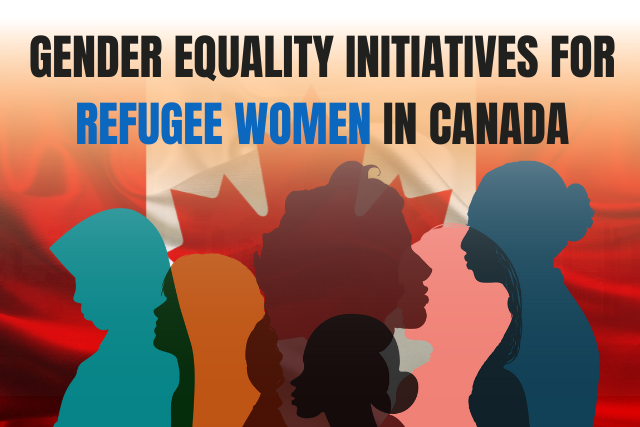Understanding Gender Inequality in Refugee Communities
Key Challenges Faced by Refugee Women
Refugee women often face significant challenges, including language barriers, limited access to education, and economic dependence. Many arrive in Canada having endured war, persecution, or gender-based violence. These experiences leave lasting scars, necessitating robust support systems to facilitate healing and integration.
Read Human Rights Advocacy for Refugees: Why It Matters for more insights into refugee challenges and human rights.
Cultural and Systemic Barriers in Host Societies
Cultural norms from home countries, combined with systemic issues in host societies, can hinder refugee women’s progress. Patriarchal attitudes and systemic discrimination in education, employment, and housing exacerbate inequality.
The Role of the Canadian Government in Promoting Gender Equality
Immigration and Refugee Protection Act (IRPA) and Gender Provisions
The IRPA incorporates gender sensitivity, ensuring women and children receive priority during vulnerability assessments. This provision highlights Canada’s dedication to addressing the unique needs of refugee women.
National Action Plans Supporting Refugee Women
Canada’s Gender Results Framework underscores the importance of integrating refugee women into broader gender equality strategies. Programmes such as the Resettlement Assistance Programme (RAP) provide funding for immediate needs, including gender-specific services.
Non-Governmental Organisations (NGOs) and Their Contributions
Prominent NGOs Supporting Refugee Women in Canada
Organisations such as the Canadian Council for Refugees (CCR) and COSTI Immigrant Services offer tailored programmes addressing the unique challenges refugee women face. These services range from mentorship to trauma-informed care.
For a deeper understanding of the contributions of social justice organisations to refugee welfare, explore Social Justice Organisations.
Funding Models for Gender-Focused Refugee Initiatives
Many NGOs rely on public-private partnerships, government grants, and international aid to sustain their operations. These funding models ensure continuous support for refugee women.
Educational Programmes Targeting Refugee Women
Language Training and Empowerment
Language proficiency is critical for integration. Programmes such as LINC (Language Instruction for Newcomers to Canada) prioritise language education for women, enabling them to navigate daily life with confidence.
Bridging Gaps in Formal Education
Many refugee women lack access to formal education in their home countries. Bridging programmes and scholarships specifically for refugee women help them pursue academic goals and improve their career prospects.
Employment Opportunities and Economic Independence
Skill Development Programmes
Skill-building workshops and job placement services empower refugee women to enter the Canadian workforce. Tailored programmes in fields such as healthcare, childcare, and hospitality equip them with practical skills aligned with market demands.
Promoting Entrepreneurship Among Refugee Women
Microloans and business mentorship initiatives encourage entrepreneurship. These programmes enable women to establish small businesses and achieve financial independence, contributing to Canada’s economy.
Healthcare Access and Gender-Sensitive Services
Mental Health Support for Refugee Women
The trauma of displacement often results in mental health challenges. Gender-sensitive counselling and support groups are essential for helping refugee women heal and regain stability.
Addressing Maternal and Reproductive Health Needs
Accessible maternal health services ensure refugee women receive appropriate prenatal and postnatal care. Programmes addressing family planning and reproductive health are equally vital.
Housing Security for Refugee Women in Canada
Overcoming Gender-Based Housing Challenges
Single mothers and survivors of gender-based violence often experience housing insecurity. Subsidised housing and safe shelters provide stability during their transition.
Collaborations for Affordable Housing
Partnerships between the government and housing organisations create affordable housing solutions tailored for refugee families, ensuring a safe environment for women and children.
Legal Aid and Advocacy for Refugee Women
Legal Representation and Gender-Based Claims
Legal aid programmes help women file asylum claims based on gender persecution. Experienced advocates ensure their voices are heard in immigration proceedings.
Advocacy for Policy Reforms
Advocacy groups push for reforms to address gender gaps in immigration policies, fostering a more inclusive system for refugee women.
Addressing Gender-Based Violence Among Refugee Women
Support Systems for Survivors of Violence
Crisis centres and hotlines provide immediate assistance. Long-term counselling services and legal advocacy further aid survivors in rebuilding their lives.
Prevention Programmes and Community Education
Educational workshops in refugee communities address the root causes of gender-based violence, promoting cultural change and community safety.
The Role of Community and Faith-Based Organisations
Building Support Networks for Refugee Women
Faith-based and community organisations offer mentorship, childcare services, and cultural orientation, fostering a sense of belonging for refugee women.
Cultural Integration While Preserving Identity
Programmes celebrate cultural heritage while encouraging integration, ensuring refugee women feel connected to their roots and their new communities.
Measuring the Success of Gender Equality Initiatives
Key Metrics and Evaluation Methods
Indicators such as employment rates, educational attainment, and housing stability track the success of gender equality programmes for refugee women.
Success Stories from Refugee Women in Canada
Personal accounts from refugee women highlight the transformative impact of Canada’s gender equality initiatives, inspiring future efforts.
Challenges and Areas for Improvement
Persistent Gaps in Policy and Implementation
Despite progress, gaps remain in service accessibility and funding consistency. Addressing these issues is critical for sustained impact.
Lessons Learned and Recommendations
Feedback from refugee communities and NGOs can guide future initiatives, ensuring inclusivity and efficiency in programme design.
Global Implications of Canada’s Approach
How Canada’s Initiatives Influence Global Gender Equality Efforts
Canada’s leadership in gender equality for refugees sets an example for other nations, showcasing the potential of inclusive policies.
Replicating the Model in Other Nations
Other countries can adopt Canada’s successful strategies, adapting them to local contexts to support refugee women worldwide.
Conclusion
Canada’s gender equality initiatives for refugee women stand as a testament to its commitment to human rights and inclusion. By addressing education, employment, healthcare, and safety, Canada offers a comprehensive framework for empowering refugee women and fostering equitable communities.
Learn more about gender equality initiatives and related efforts at Circle International.
